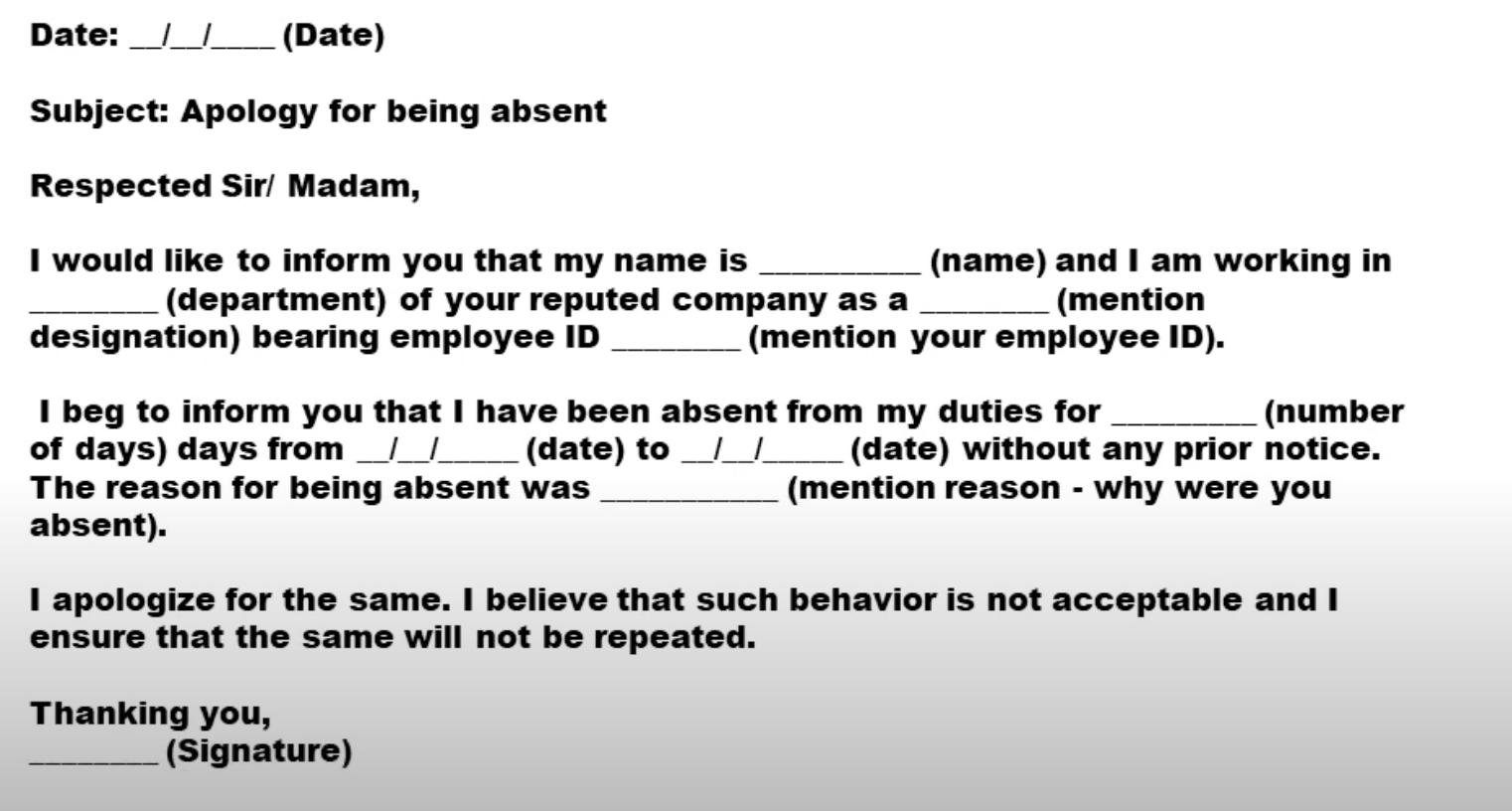Need to take a day off work but don’t know how to tell your boss?
Writing an excuse letter is a professional way to explain your absence while keeping things formal and respectful.
Whether you’re dealing with an illness, a family emergency, or a personal commitment, this guide will help you craft a witty excuse letter that gets approved without any issues.
What is an Excuse Letter?
An excuse letter is a formal document addressed to your employer, explaining why you were or will be absent from work. It should be clear, and concise, and provide necessary details without oversharing.
Key Elements of an Excuse Letter
A well-written excuse letter should include:
- Date: When you’re submitting the letter.
- Recipient’s Name & Position: Address your boss properly.
- Reason for Absence: Keep it honest but brief.
- Dates of Absence: Mention when you’ll be off.
- Offer to Make Up Work: Show responsibility by suggesting how you’ll manage your tasks.
- Contact Information: In case your boss needs to reach you.
- Professional Closing: End with a polite sign-off.
Sample Excuse Letter

[Your Name]
[Your Position]
[Company Name]
[Company Address]
[City, State, ZIP Code]
[Email Address]
[Phone Number]
[Date]
[Boss’s Name]
[Their Position]
[Company Name]
[Company Address]
General Request for Leave
Subject: Request for Leave
Dear [Boss’s Name], or “Hi” [Boss’s Name] Depending on the formalities with your superiors.
I hope this email finds you well. I am writing to formally request leave from work on [date(s)] due to [reason, e.g., a personal medical appointment/family emergency]. I understand the importance of my responsibilities and will ensure that any urgent tasks are completed before my absence. Additionally, I am happy to delegate my work or provide assistance remotely if needed.
Please let me know if you require any further details. Thank you for your understanding.
Sincerely,
[Your Name]
Medical Excuse Letter
Subject: Request for Leave Due to Illness
Dear [Manager’s Name],
I am writing to formally request a leave of absence from work due to illness. I have been experiencing severe flu symptoms and, upon consultation with my doctor, I have been advised to take [X] days off to recover. I have attached a medical certificate for your reference. I apologize for any inconvenience my absence may cause and will ensure all pending tasks are addressed upon my return.
Thank you for your understanding.
Sincerely,
[Your Name]
Family Emergency Excuse Letter
Subject: Leave Request Due to Family Emergency
Dear [Manager’s Name],
I regret to inform you that due to an urgent family matter, I will be unable to report to work on [Date]. My [family member] has been hospitalized, and I need to be present to assist with the necessary arrangements. Please let me know if any additional steps are required to ensure a smooth transition of my workload during my absence.
I appreciate your understanding and will provide updates if necessary.
Best regards,
[Your Name]
Personal Reasons Excuse Letter
Subject: Request for Leave Due to Personal Matters
Dear [Manager’s Name],
I am writing to request leave from work on [Date] due to personal reasons. While I prefer not to disclose details, I assure you that I have made arrangements to minimize any disruptions to my responsibilities.
I appreciate your support and will resume work as scheduled.
Sincerely,
[Your Name]
Pre-Planned Absence Excuse Letter
Subject: Advance Notice for Scheduled Absence
Dear [Manager’s Name],
I am writing to inform you about my upcoming absence from work on [Date] due to a pre-scheduled commitment. I wanted to give you advance notice to ensure any necessary adjustments can be made. If needed, I am happy to assist in delegating my tasks before my leave.
Please let me know if any additional steps are required on my end. Thank you for your consideration.
Best regards,
[Your Name]
Top Tips for Writing an Effective Excuse Letter

If your boss is a tyrant, writing an excuse letter requires extra finesse. You need to communicate your absence without giving them unnecessary leverage to question or penalize you.
Here are some strategic tips to keep your excuse letter airtight while avoiding unnecessary drama:
1. Keep It Short and Undebatable
Tyrannical bosses love to nitpick details and challenge excuses. Don’t give them an opening. Keep your letter brief and factual. Instead of:
❌ “I’ve been feeling unwell for a few days, and I think it’s best if I take some rest to recover properly.”
Go with:
✅ “I am unable to report to work on [date] due to health reasons. I will return on [date] as planned.”
This leaves no room for back-and-forth questioning.
2. Use Professional But Impersonal Language
You don’t owe your boss an emotional explanation. Keep the tone neutral and professional. Avoid over-apologizing or justifying yourself too much.
❌ “I hate to do this, but I need to take a day off. I hope you understand.”
✅ “I will be absent on [date] due to unforeseen personal circumstances. I appreciate your acknowledgment of this notice.”
3. Make It Sound Final, Not Optional
A toxic boss may try to manipulate you into reconsidering your absence. Instead of making it sound like you’re asking for permission, state it as an informed notification.
❌ “Would it be okay if I take the day off?”
✅ “I will be absent on [date]. Let me know if you need any necessary arrangements on my end before my leave.”
This subtly reminds them that you are still responsible and professional while making it clear that your absence isn’t up for debate.
4. Anticipate Their Suspicion and Preempt It
If your boss is prone to thinking employees are slacking off, frame your excuse to sound responsible and proactive.
✅ “I will be unavailable on [date] but will ensure all pending tasks are completed in advance. Please let me know if you need any specific preparations from my end.”
This eliminates their ability to accuse you of neglecting work.
5. Don’t Over-Explain or Overshare
The more details you give, the more ammunition a difficult boss has to question or deny your request. If they demand specifics, keep responses vague yet professional:
If asked, “What’s the personal reason?”
❌ “I have some family issues I need to take care of.”
✅ “It’s a private matter that requires my attention.”
6. If Necessary, Cite Company Policy
If your company has leave policies, subtly reinforce that you are within your rights:
✅ “As per company policy, I am informing you of my necessary leave on [date]. I will ensure smooth workflow continuity in my absence.”
This reminds them you are not seeking permission—you are using your entitled leave.
Wrapping up
Dodging the wrath of a tyrannical boss while securing a well-deserved day off is an art—part strategy, part diplomacy, and a dash of “I don’t get paid enough for this.” By keeping your excuse letter short, firm, and free of unnecessary details, you minimize the risk of interrogation while maintaining your professionalism.
Remember: You’re not asking for permission—you’re informing. You’re not making excuses—you’re managing expectations. And most importantly, you’re not a workplace hostage—you’re a professional with a right to take time off.
So craft that excuse letter with confidence, send it with conviction, and enjoy your well-earned absence (preferably somewhere far away from work emails).
If you’re interested in writing cover letters or resumes, check out our other articles.




